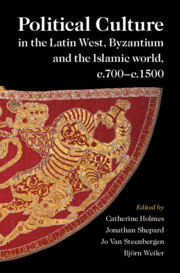 Political Culture in the Latin West, Byzantium and the Islamic World, c.700–c.1500
Political Culture in the Latin West, Byzantium and the Islamic World, c.700–c.1500 Sources
from Part I - Sources
Published online by Cambridge University Press: 11 August 2021
The chapter explores the paradoxes of the abundant sources for the west, where only a limited proportion of the population understood the dominant written language of communication, Latin; and until the fourteenth and fifteenth centuries, the reams of fiscal and judicial records which survive come mostly from a fairly narrow band of senior clerics. But the clergy were not monolithic, and their impact on the actual practice of governance varied north and south of the Alps. Much depended on the extent to which principles of Roman law and the habit of living in towns persisted. Yet there is striking consistency both in the prerequisite virtues of a ruler propounded by clerical writers and in the essentials of inauguration ritual. The law which a king swore to uphold at his coronation was not made at will: he was expected to govern consensually and heed good counsel. Who could give such counsel and what constituted reasonable constraints on the king’s volition changed over time. In some realms, assemblies developed the authority to approve taxes and become law-makers in the late middle ages: the monarch’s exercise of his authority was tempered by popular demand.
To save this book to your Kindle, first ensure [email protected] is added to your Approved Personal Document E-mail List under your Personal Document Settings on the Manage Your Content and Devices page of your Amazon account. Then enter the ‘name’ part of your Kindle email address below. Find out more about saving to your Kindle.
Note you can select to save to either the @free.kindle.com or @kindle.com variations. ‘@free.kindle.com’ emails are free but can only be saved to your device when it is connected to wi-fi. ‘@kindle.com’ emails can be delivered even when you are not connected to wi-fi, but note that service fees apply.
Find out more about the Kindle Personal Document Service.
To save content items to your account, please confirm that you agree to abide by our usage policies. If this is the first time you use this feature, you will be asked to authorise Cambridge Core to connect with your account. Find out more about saving content to Dropbox.
To save content items to your account, please confirm that you agree to abide by our usage policies. If this is the first time you use this feature, you will be asked to authorise Cambridge Core to connect with your account. Find out more about saving content to Google Drive.